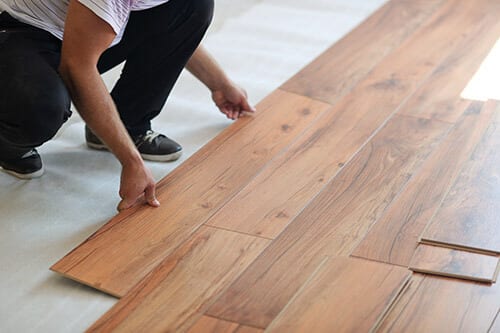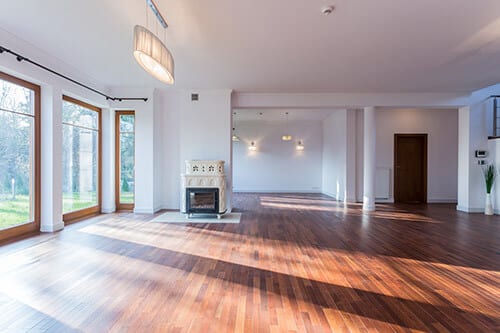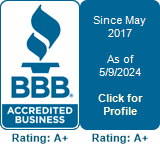Engineered hardwood flooring pros and cons
Pros
Extremely Durable
Durability a priority when it comes to engineered hardwood flooring. Each plank has a layered composition to prevent wearing and moisture absorption, and they expand and contract to avoid humidity from affecting it.
Engineered hardwood consists of a wear layer, a wood veneer, and a plywood layer. The wear layer guaards against scratching, the wood veneer gives engineered hardwood its realistic appearance, and the plywood layer provides support and protects the core of each plank.
Combined, these layers make for an extremely durable surface and should last at least 10-15 years.
Impersonates Real Hardwood
The cool thing about engineered hardwood is that it almost perfectly imitates hardwood flooring. How is this possible? The wood veneer is made of real hardwood. It can be made of oak, maple, walnut, cherry, hickory, or any other wood species of your choice.
Typically speaking, an engineered hardwood plank is topped with a clear polyurethane or aluminum oxide layer (wear layer). Therefore, the wood layer shows through the top layer, giving each plank that real hardwood look.
Your guests would be fooled into thinking it’s real hardwood flooring. The only way to tell the difference is by placing an engineered plank next to a solid hardwood plank but, even then, it’d be hard to tell the difference.
Ease of Installation
Unlike real hardwood, engineered hardwood is easy to install. The planks can be installed using the nail-down, glue-down or floating methods. The first two are pretty self-explanatory; a floating floor consists of connecting each plank by tongue and groove – like putting together a puzzle.
Since a floating floor is an option, engineered hardwood can be installed over a subfloor (as long as the subfloor is flat and stable).
Homeowners can install engineered hardwood flooring on their own. But if you want to have it installed perfectly, you should probably leave it to the pros. The installation won’t take long and the process will be a lot cleaner.
Easy Maintenance
For engineered hardwood flooring, all you need to clean up your floors is some damp mopping or sweeping. You won’t have to worry about moisture issues from light mopping the way you would with solid hardwood flooring.
Moreover, engineered hardwood isn’t stained like real hardwood. Thus, it won’t need specific chemical seals.
Slight moisture won’t seep into the surface and cause issues and the bristles of a vaccum won’t scratch the surface of enginnered hardwood flooring. Even steam cleaning is allowed for engineered hardwood flooring.
More Affordable than Real Hardwood
Engineered hardwood looks just like real hardwood, but is less expensive. The price difference isn’t huge, but engineered hardwood typically runs a few dollars less per square foot, which will definitely begin to add up. It’s also considerably less expensive to have installed.
When comparing quality, appearance, and price, it’s hard to ignore engineered hardwood flooring. There’s a reason why it’s been so popular lately. With it being such reliable flooring, it will only continue to increase in popularity.
Cons
Not Many Chances for Refinishing
One of the biggest disadvantages of engineered hardwood flooring is that you can only have it refinished a few times. Since the wood veneer later is so thin – typically 0.5 – 1.0 mm – the number of times that you can sand and refinish the surface is low and almost non-existent.
A solid hardwood floor can be sanded and refinished multiple times because the plank is 100% hardwood. Thus, the lifetime of hardwood flooring (based purely on ability to sand and refinish) is longer than that of engineered hardwood.
Range of Material Quality
You do have to be careful when selecting your engineered hardwood flooring. Since the planks are layered, it’s extremely important that you buy planks that are sturdy and durable. The wear layer, veneer, plywood, and the adhesive used to put them together, all need to be created and installed for the long-term use.
It won’t do you much good to buy cheaply-made flooring. Make sure to speak with a flooring expert first. We guarantee the engineered hardwood sold at Floors BLVD will keep form and last for a long time. We sell only the highest quality of products, regardless of the material.
Staining and Wood Grain are More Basic
Engineered hardwood looks like real hardwood, but it isn’t. Therefore, it will lack certain qualities of real hardwood. Staining won’t be needed because engineered planks are covered with a wear layer. The grain is noticeable, but not as extreme as with real hardwood. But again, it’s hard to notice these differences unless you see both planks side by side.
Floors BLVD
We hope we were able to clarify the pros and cons of engineered hardwood flooring a bit better for you. If you’re interested in engineered wood flooring, we encourage you to come visit us at Floors BLVD. We can also help you with purchase and installation!
We always have the best selection of engineered wood flooring in stock, along with laminate, tile, carpet and stone flooring. Our flooring technicians are always ready to answer any flooring questions you might have!
To learn more about our products and services, please visit floorsblvd.com.
Looking for the Best Flooring & Remodeling in Allen, TX?
We offer quality flooring and top-rated remodeling services. Call us now at (469) 535-9246 for more information.




